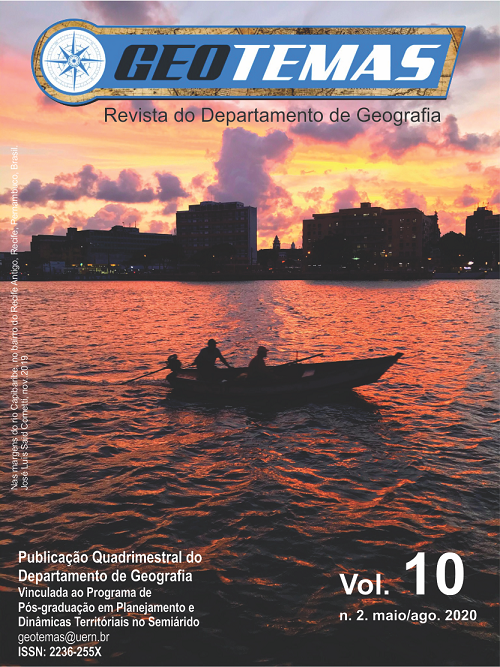La geografía entre materialidad e inmaterialidad
Palabras clave:
Objetividad, Subjetividad, Materialidad, InmaterialidadResumen
Durante la historia del pensamiento geográfico, los antagonismos se mostraron suficientemente potentes para estimular el surgimiento de corrientes muy diferentes de pensamientos y métodos de análisis geográfico: por un lado, objetividad versus subjetividad; por el otro, materialidad versus inmaterialidad. Este artículo presenta como estos antagonismos participan en el análisis geográfico, reflexionando acerca de las limitaciones de sus manifestaciones extremas, como un camino hasta el objetivo de esta reflexión teórica: la sugerencia de una posición intermedia en medio de este embrollo teórico, inspirado en el pensamiento de Augustin Berque sobre mediación de materialidad e inmaterialidad consagrada en geogramas de neologismo. Como estrategia metodológica, el texto del artículo parte de las grandes discusiones que involucraron materialidades e inmaterialidades en el período de reacción al florecimiento del neopositivismo en la década de 1950. También, se abordan las manifestaciones de objetividad y subjetividad en la investigación geográfica, pensar en la materialidad e inmaterialidad de los elementos del paisaje y los conceptos apropiados por la Geografía. La metáfora del paisaje como texto es utilizada como estrategia de reflexión, que sirvió como instrumento de reflexión acerca de los problemas derivados del uso de formas extremas de inmaterialidad. Finalmente, resalta los efectos más prácticos del desacuerdo entre materialidad e inmaterialidad, utilizando las categorías raza y cultura como instrumentos reflexivos.
Descargas
Citas
AIRES DE CASAL, M. Corografia Brasílica ou Relação Histórico-Geográfica do Reino do Brasil. São Paulo: Livraria Itatiaia Editora, 1976. 342p.
AOKI, Y. Review article: trends in the study of the psychological evaluation of landscape. Landscape Research, London, v.24, n.1, p.85-94, 1999.
APPLETON, J. Landscape evaluation: the theoretical vacuum. Transactions of the Institute of British Geographers, London, n.66, nov., p.120-123, 1975.
APPLETON, J. Running before we can walk: are we ready to map "beauty"? Landscape Research, London, v.19, n.3, p.112-119, 1994.
APPLETON, J. What landscapes means to me. Landscapes, international, v.1, n.2, p.9497, 2000.
BARNES, T. J.; DUNCAN, J. S. Writing Worlds: Discourse, Text and Metaphor in the Representation of Landscape. London and New York: Routledge, 1992. 282p.
BHABHA, H. O local da cultura. Belo Horizonte: Editora UFMG, 2013. 441p.
BERDOULAY, V. A escola francesa de geografia. São Paulo: Pesrpectiva, 2017. 255p.
BERQUE, A. Geogramas, por uma ontologia dos fatos geográficos. Geograficidade, Niterói, v.2, n.1, verão, p.4-12, 2012.
BUNKSE, E. V. Feeling is believing, or landscape as way of being in the world. Geografiska Annaler, international, v.89, i.3, p.219-231, 2007.
BURGESS, J. Editorial. Landscape Research, London, v.21, n.1, p.5-12, 1996.
CARVALHO, J. L. de. Denis Cosgrove e o desenvolvimento da perspectiva simbólica e iconográfica da paisagem. Geograficidade, Niterói, v.7, n.2, p.87-97, 2017.
CAPEL, H. Neopositivismo e Geografia Quantitativa. in: CAPEL, Horacio. Ruptura e continuidade no pensamento geográfico. Maringá: EDUEM, 2013, p.81-110.
CLAMP, P. The landscape evaluation controversy. Landscape Research, London, v.6, n.2, p.13-15, 1981.
CLAVAL, P. The cultural approach and geography – the perspective of communication. Norsk Geografisk Tidsskrift – Norwegian Journal of Geography, Oslo, v.55, n.3, p.126-137, 2001.
COLLOT, M. Rumo a uma geografia literária. Gragoatá, Niterói, n.33, 2ºsemestre, p.1731, 2012.
COLLOT, M. Poesia, paisagem e sensação. Revista de Letras, Fortaleza, v.1, n.34, p.1726, 2015.
CORRÊA, R. L.; ROSENDAHL, Z. Sobre Carl Sauer: uma introdução. (in) CORRÊA, R. L.; ROSENDAHL, Z. (Orgs.) Sobre Carl Sauer. Rio de Janeiro: Eduerj, 2011. p.11-20.
CORRÊA, R. L. Carl Sauer e Denis Cosgrove: a Paisagem e o Passado. Espaço Aberto, Rio de Janeiro, v.4, n.1, p.37-46, 2014.
COSGROVE, D. E. Towards a radical cultural geography: problems of theory. Antipode, Worcester, Vol. 5, Issue I, p.1-11, 1983.
COSGROVE, D.; Jackson, Peter. New Directions in Cultural Geography. Area, London, vol.19, n.2, jun, p.95-101, 1987.
COSGROVE, D. On "the reinvention of Cultural geography" by Price and Lewis. Annals of the Association of American Geographers, Washington, v.83, n.3, p.515-517, 1993.
COSGROVE, D. Ideas and culture: a response to Mitchell. Transactions of the Institute of British Geographers, London, v.21, p.574-575, 1996.
COSTA, M. H. B. e V. da. Paisagem e simbolismo: representando e/ou vivendo o "real"? Espaço e cultura, Rio de Janeiro, Edição comemorativa, p.157-166, 2008.
COSTA, O. Memória e Paisagem: em busca do simbólico dos lugares. Espaço e cultura, Rio de Janeiro, Edição comemorativa, p.149-156, 2008.
CRESSWELL, T. New cultural geography – an unfinished project? Cultural geographies, London, v.17, n.2, p.169-174, 2010.
DUNCAN, J. Commentary. Annals of the Association of American Geographers, Washington, v.83, n.3, p.517-519, 1993.
DUNCAN, J.; DUNCAN, N. (Re)reading the landscape. Environmental and Planning D. Society and Space, London, v.6, p.117-126, 1988.
DUNCAN, J.; DUNCAN, N. Reconceptualizing the Idea of Culture in Geography: A Reply to Don Mitchell. Transactions of the Institute of British Geographers, London, New Series, v.21, n.3, p.576-579, 1996.
FANON, F. Os condenados da Terra. Juiz de Fora: Editora UFJF, 2005. 373p.
FANON, F. Pele Negra Máscaras Brancas. Salvador: Editora UFBA, 2008. 191p.
FOSTER, E. J. Finding Geography Using Found Poetry. The Geography Teacher, international, v.9, n.1, p.26-29, 2012.
GILROY, P. Race ends here. Abringdon, Oxford: Ethnic and racial studies, London, vol.XXXI, nº5, pp.838-847, 1998.
GOLD, J. R. An introduction to Behavioural Geography. New York: Oxford University Press, 1980. 165p.
GOLD, J. R.; GOODEY, Brian. Behavioural and perceptual geography. Progress in Human Geography, London, v.7, p.578-586, 1983.
GUIMARíES, A. S. A. Classes, Raças e Democracia. São Paulo: Editora 34, 2002. 231p.
GUIMARíES, A. S. A. Preconceito e Discriminação. São Paulo: Editora 34, 2004.155p.
GUIMARíES, A. S. A. Racismo e Antirracismo no Brasil. São Paulo, Editora 34, 2009. 254p.
HART, D. A Literary Geography of Soweto. Geojournal, Berlim, v.12, n.2, p.191-195, 1986.
HART, J. F. Highest form of the Geographer´s Art. Annals of the Association of American Geographers, Washington, v.72, i.1, march, p. 1-29, 1982.
HARTSHORNE, R. Propósitos e natureza da geografia. São Paulo: Edusp, 1978. 203p.
HARVEY, D. Explanation in Geography. Bristol: Edward Arnold, 1986. 521p.
HOLZER, W. Uma discussão fenomenológica sobre os conceitos de paisagem e lugar, território e meio ambiente. Rio de Janeiro: Revista Território, Rio de Janeiro, Ano II, nº3, jul/dez, p.77 a 85, 1997.
INGOLD, T. The temporality of the landscape. World Archaelogy, international, v.25, n.2, p.152-174, 1993.
JACKSON, P. Berkeley and Beyond: Broadening the Horizons of Cultural Geography. Annals of the Association of American Geographers, Washington, v.83, n.3, p.519520, 1993.
JACKSON, P. The idea of culture: a response to Don Mitchell. Transactions of the Institute of British Geographers, London, v.21, p.572-573, 1996.
LANDO, F. Fact and Fiction: Geography and Literature. Geojournal, Berlim, v.38, n.1, p.318, 1996.
LEY, D. Cultural/humanistic geography. Progress in Human Geography, London, v.5, p.249-257, 1981.
LOWENTHAL, D. Finding valued landscapes. Progress in Human Geography, London, March, 1978.
MEINIG, D. W. Geography as an art. Transactions of the Institute of British Geographers, London, New Series, v.8, n.3, p.314-328, 1983.
MELS, T. Landscape unmasked: Kenneth Olwig and the ghostly relations between concepts. Cultural Geographies, London, v.10, p.379-387, 2003.
MEREDITH, T. The upper Columbia valley, 1900-1920: an assessment of "boosterism" and the "biography of landscape". Canadian Geographer, Ottawa, n.29, p.44-55, 1985.
MITCHELL, D. Book review of Writing Worlds: Professional Geographer, Washington, v.45, i.4, p.474-475, 1993.
MITCHELL, D. There's No Such Thing as Culture: Towards a Reconceptualization of the Idea of Culture in Geography. Transactions of the Institute of British Geographers, London, New Series, v.20, n.1, p.102-116, 1995.
MITCHELL, D. Explanation in Cultural Geography: A Reply to Cosgrove, Jackson and the Duncans. Transactions of the Institute of British Geographers, London, v.21, n.3, p.580-582, 1996a.
MITCHELL, D. Sticks and Stones: The Work of landscape (A Reply to Judy Walton´s "How real(ist) Can You Get?"). Professional Geographer, Washington, v.48, n.1, p.94-96, 1996b.
MUEHRCKE, P. C.; MUEHRCKE, J. O. Maps in literature. Geographical Review, Washington, v.64, n.3, p.317-338, jul., 1974.
NAME, L. O conceito de paisagem na geografia e sua relação com o conceito de cultura. Geotextos, Salvador, v.6, n.2, dez., p.163-186, 2010.
NASSAUER, J. I. Culture and changing landscape structure. Landscape Ecology, international, v.10, n.4, p.229-237, 1995.
OLWIG, K. R. Recovering the substantive nature of landscape. Annals of the Association of American Geographers, Washington, v.86, n.4, p.630-653, 1996.
OLWIG, K. R. All that is landscape is melted into air: the "aerography" of ethereal space. Environment and Planning D: Society and Space, London, v.29, p.519-532, 2011.
PEDROSA, B. V. O império da representação: a virada cultural e a geografia. Espaço e Cultura, Rio de Janeiro, n.39, jan./jun, p.31-58, 2016.
PIRES, C. L. Z. Entre o lugar e o além-lugar: o jogo de espelhos, paisagens, geografias. Uberlândia: Caminhos de Geografia, Uberlândia, v.18, nº63, 2017.
POCOCK, D. C. D. The paradox of human geography. Area, London, v.15, n.4, p.355358, 1983.
PORTEOUS, J. Douglas. Smellscape. Manchester: Progress in Human Geography, London, Number 9, p.356-378, 1985.
QUAINI, M. Marxismo e Geografia. Rio de Janeiro: Paz e Terra, 2002. 155p.
RELPH, E. The critical description of confused geographies (in): ADAMS, P. C.; HOELSCHER, S.; TILL, K. E. Textures of Place. Minneapolis and London: Minnesota University Press, 2001.p.150-166.
ROWNTREE, L. Cultural/humanistic geography. Progress in Human Geography, London, v.10, n.4, p.580-586, 1986.
ROWNTREE, L. Orthodoxy and new directions: cultural/humanistic geography. Progress in Human Geography, London, v.12, n.4, p.575-586, 1988.
SAíD, E. Orientalismo. São Paulo: Companhia de Bolso, 2007.523p.
SANTOS, M. Por uma Geografia Nova. São Paulo: Edusp, 2004. 285p.
SAUER, C. A morfologia da paisagem. (in): OAKES, Timothy S; PRICE, Patricia L (eds). The Cultural Geography Reader. New York: Routledge, 2008. p. 96-104.
SCHAEFER, F. K. Exceptionalism in geography: a Methodological Examination. Annals of the Association of American Geographers, Washington, v.43, n.3, p.226-249, 1953.
SEAMON, D.; LUNDBERG, A. Humanistic Geography. In: RICHARDSON, D.; et al. The International Encyclopedia of Geography: people, the Earth, Environmental and Geography, 2017. p.1-11.
SILVA, L. L. S. da.; COSTA, A. A inadequação das regionalizações culturais mediante os pressupostos do pós-colonialismo. Geotextos, Salvador, v.14, n.1, p.225-247, 2018a.
SILVA, L. L. S. da.; COSTA, A. Cultura como comunidade imaginada: uma crítica í abordagem ontológica da cultura nos estudos geográficos. Geografias, Belo Horizonte, v.16, n.1, p.27-41, 2018b.
SILVA, L. L. S. da.; COSTA, A. Questionando as delimitações cartográficas da cultura. Caminhos da Geografia, Uberlândia, v.21, n.73, p.445-457, 2020.
SMITH, N. Geography, Science and post-positivist modes of explanation. Progress in Human Geography, London, v.3, i.3, p.356-383, 1979.
TUAN, Yi-Fu. Romantic Geography: in search of the sublime landscape. Madison: Wisconsin University Press, 2013.204p.
VALENTINE, G. Whatever happened to the social? Reflections on the "cultural turn" in British Human Geography. Norwegian Journal of Geography, Oslo, v.55, p.166-172, 2001.
WALTON, J. R. How Real(ist) can you get? Professional Geographer, Washington, v.47, i.1, p.61-65, 1995.
WRIGHT, J. K. Terrae Incognitae: O lugar da imaginação na Geografia. Geograficidade, Niterói, v.4, n.2, inverno, p.4-18, 2014.
Descargas
Publicado
Cómo citar
Número
Sección
Licencia
Los autores que envían sus manuscritos a Geotemas declaran que el trabajo es un artículo original y no ha sido enviado para su publicación, total o parcial, en otra revista científica nacional o internacional o en otro vehículo de circulación. Los autores también declaran que están de acuerdo con la transferencia de los derechos de autor del artículo referido a la revista Geotemas (Universidad del Estado de Rio Grande do Norte), permitiendo publicaciones posteriores, siempre y cuando la fuente de su publicación esté asegurada. Finalmente, asumen la responsabilidad pública del artículo, conscientes de que cualquier cargo que surja de un reclamo de terceros con respecto a la autoría del trabajo puede aplicarse a ellos.





















